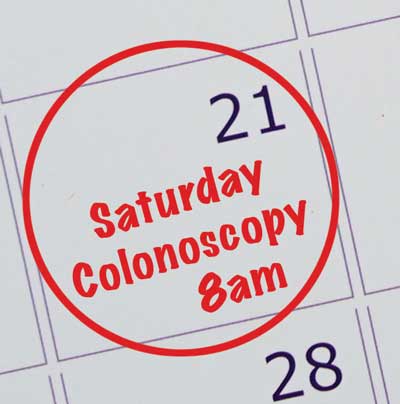Colorectal cancer doesn't discriminate against the young, so last May the American Cancer Society recommended that screening for precancerous growths in the colon begin at age 45 instead of age 50.
"We're getting a lot more phone calls from patients who want to schedule a colonoscopy," says Julie Carpenter, BSN, RN, a direct access nurse at Advocate Good Samaritan Hospital in Downers Grove, Ill. The hospital has 4 procedure rooms in which they currently schedule 12 to 13 screenings a day, but several of its GI docs are considering adding another block schedule to keep up with the expected uptick in requests for first-time colonoscopies.
Advocate Good Samaritan recently launched the Direct Access Screening Colonoscopy (DASC) program to fast-track patients who are in overall good health and at average risk for colon cancer. DASC, which has the hospital perfectly positioned to capitalize on colonoscopy volume that's expected to increase in the coming years, was designed to overcome barriers to screening and eliminate the flimsy excuses — too busy, too scared and too hesitant to endure the bowel prepping process (OK, that one has some merit) — patients use to avoid the potentially life-saving test.
Clinical team members collaborated to create a 2-page triage form, which helps nurses identify patients with risk factors that exclude them from the program, including:
- family history of colon cancer
- younger than 45 and older than 75 years
- more than a year since last visit to a primary care physician
- blood thinners
- chronic lung disease
- uncontrolled diabetes
- hypertension
- dialysis
Nurses call qualified candidates 2 to 3 weeks before scheduled procedures to discuss proper bowel prepping protocols and follow up with an email that includes detailed instructions about how to take the prep and a reminder to maintain a clear liquid diet the day before screenings. Nurses also call prescriptions for the bowel prep into the patients' preferred pharmacies. The education nurses provide help to ensure patients present for their screenings with quality bowel preps, which increases the likelihood that precancerous polyps will be spotted during their screenings. It also eliminates the need for patients to take time off from work to visit their gastroenterologists for a basic a pre-procedure health check and bowel prep instructions.
Many of the patients who are fast-tracked to procedure rooms don't have any comorbidities, aren't on medications and see their primary care doctors once a year, so the hospital's team makes it easy for them to schedule and undergo colonoscopies.
"Patients who need to get screened are professionals with full-time jobs," says Meghan Alquraishi, BSN, CMS, RN, an endoscopy nurse at Advocate Good Samaritan. "They want to get in, have their screening done and get on with their lives. We're very sensitive to working around their schedule and respecting their time."
.svg?sfvrsn=be606e78_3)


.svg?sfvrsn=56b2f850_5)